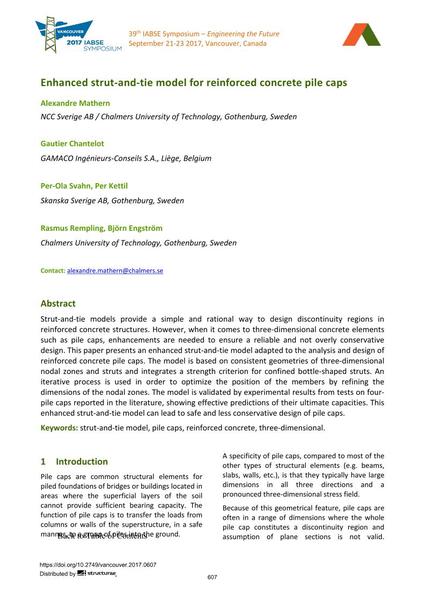Enhanced strut-and-tie model for reinforced concrete pile caps

|
|
|||||||||||
Détails bibliographiques
| Auteur(s): |
Alexandre Mathern
(NCC Sverige AB / Chalmers University of Technology, Gothenburg, Sweden)
Gautier Chantelot (GAMACO Ingénieurs-Conseils S.A., Liège, Belgium) Per-Ola Svahn (Skanska Sverige AB, Gothenburg, Sweden) Per Kettil (Skanska Sverige AB, Gothenburg, Sweden) Rasmus Rempling Björn Engström (Chalmers University of Technology, Gothenburg, Sweden) |
||||
|---|---|---|---|---|---|
| Médium: | papier de conférence | ||||
| Langue(s): | anglais | ||||
| Conférence: | IABSE Symposium: Engineering the Future, Vancouver, Canada, 21-23 September 2017 | ||||
| Publié dans: | IABSE Symposium Vancouver 2017 | ||||
|
|||||
| Page(s): | 607-614 | ||||
| Nombre total de pages (du PDF): | 8 | ||||
| Année: | 2017 | ||||
| DOI: | 10.2749/vancouver.2017.0607 | ||||
| Abstrait: |
Strut-and-tie models provide a simple and rational way to design discontinuity regions in reinforced concrete structures. However, when it comes to three-dimensional concrete elements such as pile caps, enhancements are needed to ensure a reliable and not overly conservative design. This paper presents an enhanced strut-and-tie model adapted to the analysis and design of reinforced concrete pile caps. The model is based on consistent geometries of three-dimensional nodal zones and struts and integrates a strength criterion for confined bottle-shaped struts. An iterative process is used in order to optimize the position of the members by refining the dimensions of the nodal zones. The model is validated by experimental results from tests on four- pile caps reported in the literature, showing effective predictions of their ultimate capacities. This enhanced strut-and-tie model can lead to safe and less conservative design of pile caps. |
||||
| Mots-clé: |
semelles
|
||||
